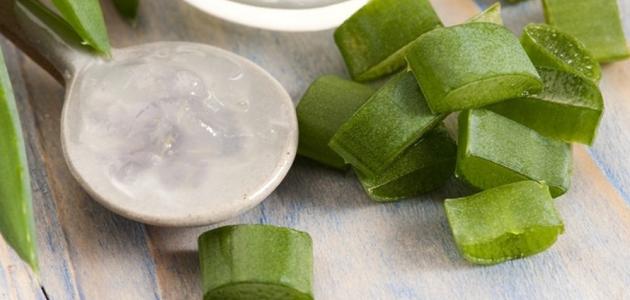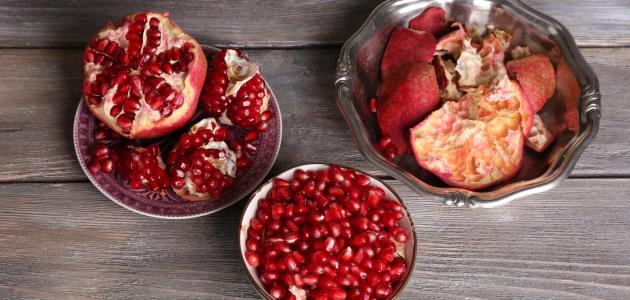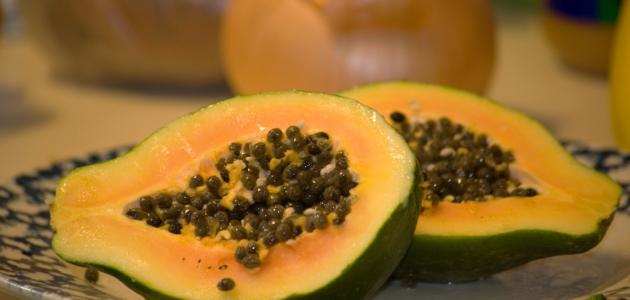Contents
Aloe Vera
Aloe vera is known as a perennial plant that adapts to areas with scarce water, as it is characterized by its ability to store large quantities of water in its tissues, and many types of aloe vera plants, including aloe vera, have green leaves covered with a thick crust and yellow tubular flowers, and the transparent inner core is covered with a thin layer of The vessels, the length of the leaf of the aloe vera plant ranges from 30 to 50 centimeters and its width reaches 10 centimeters, and the aloe vera plant contains two main types of liquids; The first liquid Ballatyks knows and have passed the taste and has a yellow color, while the second is a liquid gel is transparent snotty, [1] It should be noted to the spread of the uses of the plant Aloe Vera recently, it became used in the preparation of food; This is after the Food and Drug Administration approved it as a food flavoring agent and a nutritional supplement. [2]
The nutritional value of Aloe Vera
The following table shows the most important nutrients in 100 grams of aloe vera juice: [3]
| The food component | Nutritional value |
|---|---|
| water | 96.23 ml |
| Calories | 15 calories |
| Carbohydrates | 3.75 grams |
| Sugars | 3.75 grams |
| Calcium | 8 milligrams |
| Iron | 0.15 milligram |
| Sodium | 8 milligrams |
| vitamin C | 3.8 milligrams |
Benefits of Aloe Vera
Aloe vera content of nutrients
- A rich source of antioxidants: Regular intake of aloe vera gel can help raise levels of antioxidants in the blood, and it is worth noting that antioxidants contribute to reducing the damage caused by free radicals ; Which is linked to many chronic diseases . [4]
Benefits of aloe vera according to the degree of effectiveness
Possibly Effective
- Relief from constipation: Consuming a mixture of herbs containing aloe vera may increase bowel movements and soften stools, indicating its ability to relieve constipation and reduce reliance on laxatives, according to a study published in the journal Digestion. [5]
- Helping to reduce blood sugar levels: Consuming aloe vera may contribute to improving the control of blood sugar levels in patients with type 2 diabetes , according to what was indicated by one of the studies published in the Journal of Clinical Pharmacy and Therapeutics in 2016. More studies are needed to prove this benefit. [6]
- Helping to lose weight: Aloe vera has anti-obesity properties, as consuming aloe vera helps reduce the accumulation of fat in the body by stimulating energy burning, and it may also contribute to reducing the risk of obesity resulting from an unhealthy diet, according to what she indicated A study published in the Journal of Nutritional Science and Vitaminology in 2012. [7]
There is insufficient evidence of its effectiveness
- Reducing mucosal inflammation: The consumption of aloe vera juice may reduce the severity of mucositis caused by radiation therapy in patients with head and neck cancer, according to a study published in the Asian Biomedicine in 2009. [8]
- Help reduce the accumulation of dental plaque: , the use of toothpaste containing aloe vera daily for 24 weeks may contribute to reducing the accumulation of plaque on the teeth, according to what has been indicated by some studies, while other research has shown that the effect of using aloe vera Toothpaste containing aloe vera is the same as using toothpaste that contains fluoride. [9]
- Helping improve ulcerative colitis: Taking 100 ml of aloe vera gel twice daily for 4 weeks may relieve ulcerative colitis, as the results of a study published in the journal Alimentary pharmacology and therapeutics in 2004 showed tissue improvement in people with inflammation Ulcerative colitis after using aloe vera gel, but more studies are needed to confirm this benefit. [10]
- Other benefits There is not enough to prove evidence: can help eating plant aloe vera to relieve some health problems or reduce the risk of them, but there is still a need for more evidence to prove the effectiveness of aloe vera plant in it, and in what some health problems comes: [ 9]
- asthma.
- Bleeding
- Colds.
- Depression .
- Epilepsy.
- Glaucoma in Al-Ain.
- Menstruation stops.
- Multiple sclerosis.
- Varicose veins.
- Vision problems.
Scientific studies on the benefits of aloe vera
- A review of several studies published in the Journal of Neurogastroenterology and Motility in 2018 indicated that taking aloe vera may significantly reduce symptoms associated with colon irritation . [11]
- A study conducted on mice and published in the journal Carbohydrate Polymers in 2009 indicated that consuming the multiple sugars present in the aloe vera plant may boost immunity and combat oxidative stress in people with mouth ulcers. [12]
Damage to aloe vera
The degree of safety of aloe vera
Aloe vera plant is potentially safe when consumed in moderate amounts and for a short period, and it is worth noting that aloe vera gel was used safely at a dose of 15 ml for a period of up to 42 days, and a dose of 600 mg of a product containing aloe vera gel was consumed for a period of up to 8 weeks safely, but It should be noted that it is possible that it is not safe to consume any dose of the latex present in the aloe vera plant or extracts that contain all the ingredients of the aloe vera leaf, and in fact, consuming large quantities of the latex present in aloe vera is often unsafe . The latex present in the aloe vera plant can cause some side effects such as stomach pain and cramps, diarrhea, kidney problems, blood in the urine, in addition to potassium deficiency .Muscle weakness, weight loss, and heart disorders, as taking one gram of aloe vera latex daily for several days may lead to death.
It should be noted that chemical compounds in Aloe Vera latex or in Aloe Vera leaf extract can contribute to the development of cancer, and some reports have shown that consuming aloe vera may cause liver problems. Although this is not common; However, it can occur in people who suffer from hypersensitivity to aloe vera, [9] and what comes to the degree of safety of aloe vera in some cases: [13]
- Pregnancy and breast-feeding: It is possible that it is not safe to take the gel or latex in the aloe vera plant during pregnancy and lactation, as some reports have indicated that aloe vera is associated with miscarriage and may increase the risk of birth defects, so it should not be taken during pregnancy or lactation.
- Children: It may not be safe to take latex or aloe vera leaf extract for children under the age of 12, as this can cause stomach pain, cramps, and diarrhea .
Precautions for using aloe vera
The use of the aloe vera plant is warned in the following cases: [14]
- Diabetes: Some research has shown that taking aloe vera may lead to hypoglycemia, so it is advised that diabetics carefully monitor blood sugar levels when consuming aloe vera.
- Intestinal conditions: You should avoid consuming the latex present in aloe vera when suffering from intestinal problems such as: Crohn's disease, ulcerative colitis , or intestinal obstruction, as taking aloe latex may cause intestinal irritation It should also be noted that some whole aloe vera leaf products may contain quantities of latex, so it is advised to avoid consuming them as well for these patients.
- Hemorrhoids: It is advised not to take aloe latex when suffering from hemorrhoids , as its consumption can aggravate the condition, and as mentioned previously, products made from whole aloe vera leaves may contain some latex.
- Kidney problems: Taking high doses of aloe vera latex is associated with a risk of kidney failure and some other serious conditions. [13]
- Surgery: As mentioned previously, aloe vera can affect blood sugar levels, and it can interfere with the ability to control blood sugar before and after surgery, so you should stop consuming aloe vera at least two weeks before undergoing surgery. [13]
Drug interactions
The use of aloe vera can interfere with some medicines, and some of them are as follows: [15]
- Digoxin medicine: , as taking aloe latex contributes to lowering potassium levels in the body. This increases the risk of side effects from digoxin.
- Diabetes medications: Taking aloe vera gel can lower blood sugar levels, and this is what anti-diabetic drugs do. This is because taking them together may lead to a significant decrease in blood sugar levels. Therefore, as mentioned previously, diabetic patients should be monitored by carefully monitoring their blood sugar levels when consuming aloe vera.
- Oral medications: The latex present in the aloe vera plant is a laxative, so it may reduce the body's absorption of medicines that are consumed orally, and this reduces their effectiveness.
- Sevoflurane medicine: , one of the drugs used for anesthesia during surgery, it should be noted that the use of aloe vera may reduce blood clotting, and this is what medicine sevoflurane do also; Thus, using them together may lead to bleeding during the surgery, so it is recommended to avoid using aloe vera two weeks before undergoing surgeries.
- Stimulant laxatives: As mentioned previously, Aloe Vera latex is one of the laxatives that speed up bowel movement, so taking it along with other stimulant laxatives may lead to a significant increase in bowel movement. Which can cause dehydration and lack of minerals in the body.
- Warfarin: Taking aloe latex can cause diarrhea. This can increase the side effects of warfarin as well as increase the risk of bleeding.
- Diuretics: Taking aloe vera latex together with diuretics may significantly reduce potassium levels in the body.
How to take aloe vera
Drinking aloe vera juice is one of the easiest ways to take aloe vera, and it should be noted that it is not recommended to use the whole aloe vera stalk to prepare the juice, as the aloe vera gel can be mixed with water and drunk, and to avoid the bitter taste of aloe vera, it can be soaked in water for a whole night and then only drink water. Mixing aloe vera with some fresh juices such as orange juice , lemon, or grapes to hide the flavor and texture of sticky aloe vera, and it is worth noting that fresh aloe vera pieces can also be added to salads as a main ingredient, or aloe vera jelly can be used in preparing salad dressings, and aloe vera can be cooked but It is advisable to use large pieces of it for cooking; This is because the plant shrinks its size during cooking due to the loss of a lot of water, and in addition to that, pieces of aloe vera can be boiled or steamed before being used in juices and soups to improve their taste and texture, [16]It should be noted that the aloe vera plant can be taken in the form of capsules as nutritional supplements. [17]
References
- ↑ "ALOE VERA" , www.monographs.iarc.fr , Retrieved 2-8-2020. Edited.
- ↑ Tim Newman (13-9-2017), "Nine health benefits and medical uses of Aloe vera" , www.medicalnewstoday.com , Retrieved 2-8-2020. Edited.
- ↑ "Aloe vera juice drink" , www.fdc.nal.usda.gov , 4-1-2020, Retrieved 7-30-2020. Edited.
- ↑ Ryan Raman (2-11-2018), "Can You Eat Aloe Vera?" , Www.healthline.com , Retrieved 2-8-2020. Edited.
- ↑ Odes S And Madar Z (1991), “A Double-Blind Trial of a Celandin, Aloevera and Psyllium Laxative Preparation in Adult Patients with Constipation” , Digestion , Issue 2, Folder 49, Page 65-71. Edited.
- ↑ N Suksomboon, N Poolsup And S Punthanitisarn (2016), “Effect of Aloe vera on glycaemic control in prediabetes and type 2 diabetes: a systematic review and meta analysis” , Journal of clinical pharmacy and therapeutics , Issue 2, Folder 41, Page 180-188. Edited.
- ↑ Eriko Misawa, Miyuki Tanaka, Kazumi Nabeshima And Others (2012), “Administration of Dried Aloe vera Gel Powder Reduced Body Fat Mass in Diet-Induced Obesity (DIO) Rats” , Journal of Nutritional Science and Vitaminology , Issue 3, Folder 58 , Page 195-201. Edited.
- ↑ Putipun Puataweepong, Mantana Dhanachai, Somjai Dangprasert And Others (4-8-2009), "The efficacy of oral Aloe vera juice for radiation induced mucositis in head and neck cancer patients: a double-blind placebo-controlled study" , Asian Biomedicine , Issue 4, Folder 3, Page 375-382. Edited.
- ^ A b t "ALOE" , the www.webmd.com , Retrieved 2-8-2020. Edited.
- ↑ L Langmead, R Feakins, S Goldthorpe And Others (2004), “Randomized, double ‐ blind, placebo ‐ controlled trial of oral aloe vera gel for active ulcerative colitis” , Alimentary pharmacology & therapeutics , Issue 7, Folder 19, Page 739 -747. Edited.
- ↑ Seung Hong, Jaeyoung Chun, Sunmin Park And Others (2018), “Aloe vera Is Effective and Safe in Short-term Treatment of Irritable Bowel Syndrome: A Systematic Review and Meta-analysis” , Journal of neurogastroenterology and motility , Issue 4, Folder 24, Page 528-535. Edited.
- ↑ ZhanHai Yu, Che Jin, Ma Xin And Others (2009), “Effect of Aloe vera polysaccharides on immunity and antioxidant activities in oral ulcer animal models” , Carbohydrate Polymers , Issue 2, Folder 75, Page 307--311. Edited.
- ^ A b T " products Aloe" , Www.medicinenet.com , Retrieved 2-8-2020. Edited.
- ↑ "Aloe" , www.emedicinehealth.com , 17-9-2019, Retrieved 3-8-2020. Edited.
- ↑ "ALOE" , www.rxlist.com , 17-9-2019, Retrieved 3-8-2020. Edited.
- ↑ Marie Dannie (12-24-2019), "How to Eat Raw Aloe" , www.livestrong.com , Retrieved 3-8-2020. Edited.
- ↑ Carlos Tello (7-28-2020), “8 Benefits of Aloe Vera + Side Effects , ” www.selfhacked.co , Retrieved 3-8-2020. Edited.






